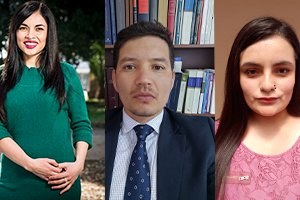- News
ULS researcher founds interdisciplinary research group focused on academic, scientific and professional discourse

With the aim of investigating, generating knowledge and disseminating research work on academic, scientific and professional discourse, in research articles, presentations and conferences, the ULS academic and researcher, Dr. Paulina Meza, together with the New York City College researcher of Technology (CUNY), Dr. David Sánchez-Jiménez, founded the Interdisciplinary Research Group on Academic, Scientific and Professional Discourse (GRIDACIP), which brings together specialists in Linguistics, Education, Evaluation, Psychology and Law. This group has the particularity of being made up of academics, researchers and students from different houses of study, who work collaboratively in the development of research in academic discourse.
Its members are the ULS researcher, Dr. Paulina Meza; the ULS academic, Dr. Mauricio González; CUNY researcher, Dr. David Sánchez-Jiménez; the PUCV researchers, Dr.(c) Felipe González and Mg. Jadranka Gladic the UCN academic, Mg. Israel Gutierrez; the researchers Dr.(c) Fernando Lillo and Melissa Castellón, and the student of Pedagogy in Spanish and ULS Philosophy, Camila Urízar. Since its formation, GRIDACIP has published the results of its research in both national and international journals, in addition to presenting them at congresses and conferences in Chile and abroad. Likewise, they have organized international cooperation activities, which have allowed foreign researchers to visit the University of La Serena to share with teachers and students. interdisciplinary group.
 Dr. Paulina Meza highlighted the importance of having an interdisciplinary research group and encouraging research in the university community. “This is an interdisciplinary research group, which is rare. In general, in research like the one we are carrying out, linguists traditionally say what the discourse of law, medicine, engineers, etc. is like, but the protagonists of the different areas are almost never involved. It is important, through work like the one we carry out, to be able to promote research and stimulate research interest in students, as well as in professors, not only from the ULS, but also from other universities." To this she added that the development of research activities and products, such as the creation of this group, for example, is possible thanks to the support of DIDULS and VIPULS. In addition, she highlighted that all the achievements they have had as a group are due to the commitment and motivation of each of the members.
Dr. Paulina Meza highlighted the importance of having an interdisciplinary research group and encouraging research in the university community. “This is an interdisciplinary research group, which is rare. In general, in research like the one we are carrying out, linguists traditionally say what the discourse of law, medicine, engineers, etc. is like, but the protagonists of the different areas are almost never involved. It is important, through work like the one we carry out, to be able to promote research and stimulate research interest in students, as well as in professors, not only from the ULS, but also from other universities." To this she added that the development of research activities and products, such as the creation of this group, for example, is possible thanks to the support of DIDULS and VIPULS. In addition, she highlighted that all the achievements they have had as a group are due to the commitment and motivation of each of the members.
For his part, the lawyer and member of GRIDACIP, Mg. Israel Gutiérrez, referred to the multidisciplinary work of the group, from his perspective as a lawyer, indicating that “being part of a quality interdisciplinary body has been a very positive experience, and that has given rise to work that has aroused interest in different latitudes. , as a result, precisely, of a view that includes linguistic aspects but projected from a practical legal level and that, without a doubt, contributes to a trend that, for some years, points towards the need to provide clarity and greater simplicity to the various legal texts. Finally, Camila Urizar, ULS Pedagogy in Spanish and Philosophy student, referred to the importance of being part of GRIDACIP, being an undergraduate student.
“This has been a new and at the same time positive experience, since it gives me a different perspective than what the university provides me in terms of the research process. Thanks to the group I have been able to learn more about the processes for acquiring financing, the publication of articles and everything that entails. Likewise, the importance of collaborative work between professionals from different areas, which will even help me when I am working as a teacher.
I have been able to share with established researchers and it has been enriching, given that I have participated in the project as a pair. At the same time, I consider that the work we are doing has many applications, which I personally like, since I can extrapolate the results of the project to my professional future, whether as a researcher or teacher. From my perspective, as an undergraduate student, the opportunities to conduct and publish research are usually scarce. Therefore, for me, having this opportunity and being a member of GRIDACIP is invaluable.
I would like the university to open up to promoting the creation of new research groups and, I hope, they follow the same line as ours, regarding including undergraduate students like me.” More information about this group is available at https://gridacip.com/.
Written by Tomás Rodríguez, DirCom.
